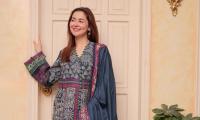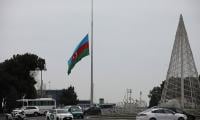LAHORE : The 13th Annual International THAAP Conference, titled Rivers of Harappa, concluded its two-day proceedings, providing an essential platform for scholars to explore the cultural heritage and historical significance of the Harappan civilisation. With 16 papers presented across five sessions, the conference delved into various facets of Harappan life, art, and symbolism, enriching participants’ understanding of one of the world’s most enduring civilisations.
Professor Dr. Kanwal Khalid chaired the fourth paper reading session and set a thought-provoking tone for the discussions. The first speakers, Najia Sarwar and Maheen Yousaf, proposed adding depth to historical narratives by tracing the generational legacy of indigo dye, a staple of Harappan civilisation. In their insightful paper, Indigo as a Milieu of Harmony and Sustainability, the researchers examined the role of indigo dye in Harappan textiles, illustrating how this ancient craft became a unifying element within Harappan society and connected past practices with enduring textile traditions. Following Sarwar and Yousaf, architect M Abdullah presented his paper titled Echoes of the Past: Tracing Harappan Cultural Elements in Punjabi Folk Songs. Abdullah explored the symbolic connections between Harappan motifs and Punjabi folk songs, emphasising how Harappan culture continues to resonate in regional folklore.In a thought-provoking contribution, Prof Dr Kanwal Khalid highlighted the limitations of conventional archaeological narratives in her paper, Unlearning of Learning: Dimensions of Harappan Excavations. She argued for recognising oral traditions and folk customs as essential sources, promoting a more holistic understanding of Harappa beyond physical artefacts.
The fifth paper reading session, chaired by Dr. Tohid Ahmad Chattha, provided profound insights into the artistic, cultural, and symbolic significance of rivers in the Harappan civilization. Ayesha Latif introduced her paper, Reading the Motif of the River in Punjabi Sufi Poetry, examining how river symbolism in Sufi poetry, especially in the works of poets like Shah Hussain and Bulleh Shah, mirrors Harappan reverence for water, blending ancient beliefs with later spiritual themes.
Following her, Maheen Yousaf presented her paper titled Transcending Boundaries of the Harappan Rivers through the Trefoil Motif. She analysed the trefoil symbol, found across several ancient cultures, including Harappa, proposing that it serves as a shared emblem linking diverse societies through a common artistic language.
Dr. Tohid Ahmad Chattha concluded the session with his research titled Textile Traditions and Riverine Influences: Reconstructing ‘A Punjabi Saropa’ through Harappan Designs. Chattha focused on the lasting impact of Harappan textile patterns on modern Punjab, presenting a reconstructed “Punjabi Saropa”—an indigenous design used in historical monuments such as Shalimar Gardens, as well as in homes, buildings, and cultural textiles—showcasing the resilience of these ancient designs.
Contributing to the session, Raza Naeem presented insights from Mustansar Hussain Tarar’s novel Bahao, examining the roles of Harappan women as creators and preservers. His analysis connected Tarar’s literary work to historical Harappan figures, highlighting the civilisation’s artistic and cultural legacy.
The conference concluded with an engaging Harappa Circle roundtable discussion, where participants explored the relevance of oral heritage and tradition in recontextualising Harappa archaeological and anthropological narratives. This open forum encouraged lively exchanges, emphasising the importance of diverse perspectives in understanding the complexities of Harappan society.
Prof. Pervaiz Vandal and Prof. Sajida Vandal, in their closing remarks, expressed gratitude for the attendees’ contributions, underscoring THAAP’s dedication to promoting historical understanding and appreciation of Harappa’s enduring legacy.
Punjab Information Minister Azma Bokhari cutting a cake on December 25, 2024.—...
Punjab Assembly Speaker Malik Ahmad Khan chairs a session on February 28, 2024. —...
Punjab police personnel stand guard in Lahore on December 8, 2023. — Facebook@DIGOpsLahorePoliceLAHORE:The Punjab...
Representational image of police tape at an incident site. — Unsplash/FileLAHORE:The Emergency Services Department ...
Representational image of a jail cell. — Reuters/FileLAHORE:Despite being granted post-arrest bail by an Additional...
A big flag of Pakistan is seen with the mausoleum of Quaid-e-Azam in the background amid Independence Day celebration...







